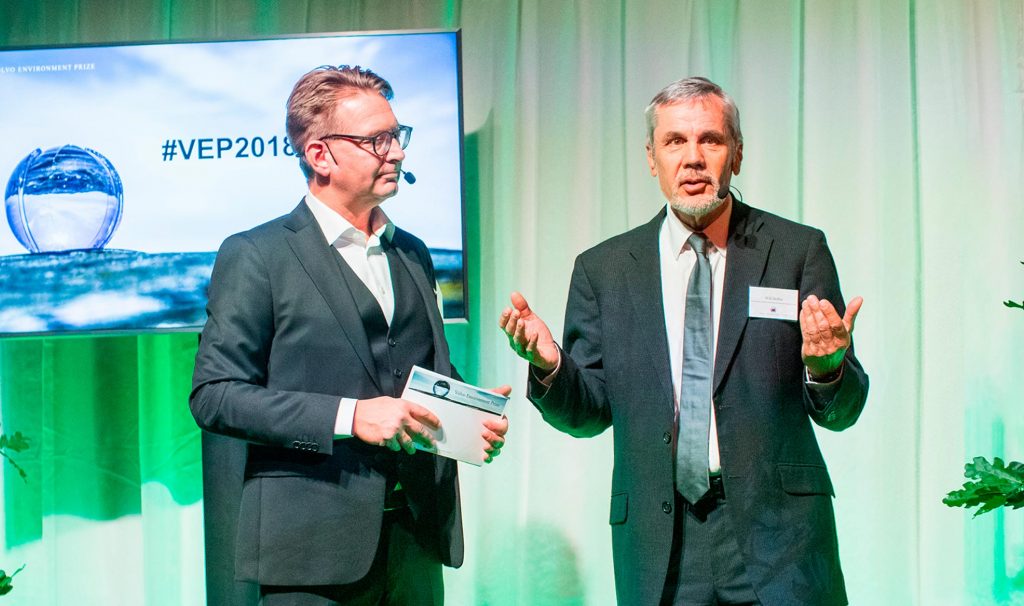 Niklas Gustafsson (left), Chairman of the Steering Group for the Volvo Environment Prize and Will Steffen, Chairman of the Prize Jury, during a Q & A session during the award ceremony 2018.
Niklas Gustafsson (left), Chairman of the Steering Group for the Volvo Environment Prize and Will Steffen, Chairman of the Prize Jury, during a Q & A session during the award ceremony 2018.
The Volvo Environment Prize event 2023 starts soon.
Niklas Gustafsson, Chairman of the Steering Group for the Volvo Environment Prize talks to Will Steffen, Chairman of the Prize Jury, about the selection process for the award.
 Niklas Gustafsson (left), Chairman of the Steering Group for the Volvo Environment Prize and Will Steffen, Chairman of the Prize Jury, during a Q & A session during the award ceremony 2018.
Niklas Gustafsson (left), Chairman of the Steering Group for the Volvo Environment Prize and Will Steffen, Chairman of the Prize Jury, during a Q & A session during the award ceremony 2018.
Niklas Gustafsson:
When selecting a candidate, what are the most important criteria?
Will Steffen:
Scientific excellence is the most important criterion. The candidate must have an outstanding research and publication record in his or her field. Then we look at the candidate’s contribution to society more generally. This is often through close collaboration with the policy and application sectors. Finally, we also look at the candidate’s influence on his/her field of study. Has the candidate been a key figure in the field, making major contributions or perhaps even changing the direction of research in the field? But the most important criterion is the first – scientific excellence.
Niklas Gustafsson:
It is now almost 30 years since the inception of the award. Environment and sustainability issues have changed considerably during that period. What do you think are the biggest changes?
Will Steffen:
I think there are at least three significant trends that have changed the environment and sustainability research fields. First, there is an increasing emphasis on systems thinking rather than the more simple cause-effect logic. Second, more complex research questions are being tackled, and this means that more work occurs in large research teams, with leadership becoming an important quality in the top researchers. Finally, “co-production of knowledge” is becoming an important approach, where the researchers collaborate closely with practitioners, from the formulation of the research questions themselves all the way to the publication and communication of the work.
Niklas Gustafsson:
This is not an award you can get only because of your engagement in sustainability. You mentioned earlier the strong emphasis on scientific excellence. Can you tell us more about this?
Will Steffen:
Yes, we set the bar very high for the Volvo Environment Prize. Laureates certainly need to be engaged in sustainability, but our first requirement is scientific excellence. Here we are in a good position in that there are a large number of very deserving candidates in terms of the quality of their research. Fewer of these researchers engage effectively with the policy or practitioner communities whilst maintaining their scientific excellence and productivity. It is these scientists that rank highest in our assessments.
Niklas Gustafsson:
If we look at research areas such as medicine and computer sciences, there have been tremendous breakthroughs during the past decades giving us things like gene therapy and artificial intelligence. Do you believe we will have similar breakthroughs in the environmental and sustainability sciences?
Will Steffen:
We have already seen very significant breakthroughs here. There is an explosion in complex system science and complex system thinking – resilience thinking and Earth System science are two prominent examples. In conjunction with these trends, we are seeing much stronger inter-and transdisciplinarity in the research. Gone are the days when a researcher can sit in his or her corner and focus on a very narrow topic without considering how it fits into the broader picture. Some groups are even tackling the dynamics of the the Earth System as a whole, including humanity’s role in these dynamics.
Niklas Gustafsson:
Sometimes there is criticism against scientific awards such as ours, in that they almost always are awarded to researchers from the Western world, and frankly often to North American Universities. Will this change, do you think?
Will Steffen:
This is an understandable problem given the large amount of high quality research in Western countries and Japan, but this is changing rapidly. Research is becoming more global – today many more world-class researchers in Latin America and Africa are pursuing their research in their own countries. And, of course, China is rapidly becoming a research powerhouse, as are other countries in Asia.
Niklas Gustafsson:
What do you see ahead, in the coming 5-10 years, when looking at the development of science and research around sustainability issues?
Will Steffen:
The field of environment and sustainability research is becoming much broader, larger in scale, and far more complex. These are very exciting times, as the need for such research becomes better recognized in the policy and corporate worlds. It is also good for the Volvo Environment Prize, because we are getting so many outstanding candidates and, thus, world-class laureates.